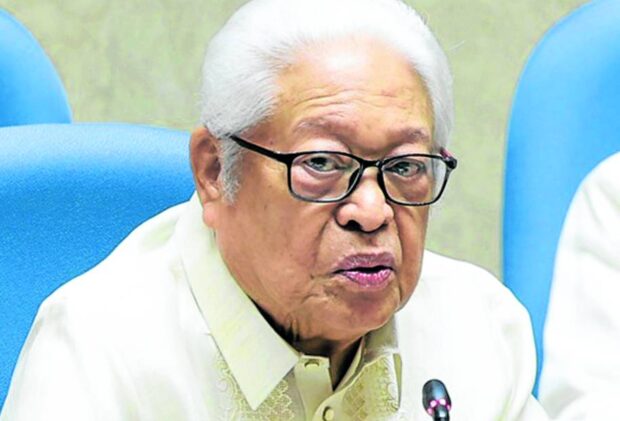Lagman: 1987 Constitution intends joint voting of Congress for Cha-cha

FILE PHOTO: For Albay 1st District Rep. Edcel Lagman, the Senate and House of Representatives should meet as one body and eventually vote jointly if both agree to amend the 1987 Constitution. PHOTO FROM HOUSE OF REPRESENTATIVES FB PAGE
MANILA, Philippines — For Albay 1st District Rep. Edcel Lagman, the Senate and House of Representatives should meet as one body and eventually vote jointly if both agree to amend the 1987 Constitution’s economic provisions.
According to the veteran lawmaker, such a method is what the Constitution framers intended – a unicameral Congress, a single legislative body.
While he acknowledged that petitions may be filed before the Supreme Court to clarify how Charter amendments should proceed, Lagman explained that framers of the 1987 Constitution planned to allow that same unicameral Congress to convene and amend the basic law, and therefore, let every elected lawmaker get one vote.
“Well alam mo, ang sabi ni (former) Chief Justice (Reynato) Puno, itong provision sa Konstitusyon, ‘yong tinatawag niyang Article 17, Section 1 tungkol sa Congress can by three-fourths vote amend the Constitution. Ang sabi ni Chief Justice Puno, ito ay inadvertence, nakalimutan nila […] na palitan ‘yong original provisions sapagkat ang akala ng mga members of the Constituent Commission ay unicameral ang ating Kongreso,” Lagman said during The Agenda forum in San Juan City on Friday.
(You know, former Chief Justice Puno said this about Article 17, Section 1 of the Constitution, which states that amendments can push forward through a three-fourths vote. Chief Justice Puno said this is an inadvertence, they forgot to fix the original provisions because the members of the Constituent Commission thought Congress would be unicameral.)
Article continues after this advertisement“Kailangan ‘yan susog doon sa dating provisions ng Constitution, of constituent assembly na meeting jointly muna, jointly sapagkat dalawang kamara ‘yan, hindi hiwalay. Ang ginagawa natin ngayon hiwalay, parang mag-asawa na dini-divorce na ah? Hiwalay. Eh hindi tama, kailangan joined meeting, ‘di ba? At bakit joint meeting? Sapagkat nga ang mga congressmen at senador ay hindi nag-aattend ng constituent assembly as legislators,” he added.
Article continues after this advertisement(We also need to stick with the previous provisions of the Constitution, of the constituent assembly that they should meet jointly first, jointly because that’s two Houses of Congress, not separate. What we’re doing now is separate, like a couple being divorced. But that’s not the case, it should be a joint meeting, because congressmen and senators do not attend the constituent assembly as legislators.)
After meeting jointly, Lagman said lawmakers – regardless whether they are from the Senate or the House – would get one vote since they are considered as a singular body.
“Hindi sila gumagawa ng batas, they are exercising constituent powers, ang pag-amyenda ng Saligang Batas. Ngayon, meeting jointly. Voting jointly ba o separately? Yan ang isang malaking question na kailangang ma-resolve ng Korte Suprema,” he said.
(They are not crafting laws, they are exercising constituent powers, to amend the Constitution. Now, meeting jointly. Should it also be voting jointly or separately? That’s the big question that the Supreme Court should resolve.)
“Pero sa aking palagay – without any partisanship on the results of voting jointly – eh ang palagay ko voting jointly ito sapagkat unicameral ang constituent assembly, walang senador ‘yan, walang congressman, walang representative, walang Senate. Unicameral,” he added.
(But in my opinion – without any partisanship on the results of voting jointly – I think this should be voting jointly because the constituent assembly is unicameral, there’s no senator, no congressman, no representative, no Senate. Unicameral.)
Lagman also noted that provisions in the 1987 Constitution should be harmonized.
“Ngayon ba, ipagpapatuloy natin ang inadvertence na ito? O ‘yong pagkakamali? Palagay ko hindi, meron tayong kailangang gawin. We should harmonize the provisions of the Constitution. ‘Yan ang isang basic rule sa construction: you harmonize the provisions,” he added.
(Should we continue this inadvertence? Or the error? I think not, we should do something. We should harmonize the provisions of the Constitution. That’s the basic rule in construction: you harmonize the provisions.)
Both the House and the Senate are pushing for constitutional amendments – the House through Resolution of Both Houses (RBH) No. 7, and the Senate through RBH No. 6.
The House last Wednesday approved RBH No. 7 on second reading via viva voce or voice voting – six session days of deliberation by a House committee of the whole, and three session days of debate at the plenary level.
Under the RBH No. 7 – which was derived from the RBH No. 6 – the industries of public utility, basic education, and advertising would be opened to foreign ownership by adding the phrase “unless otherwise provided by law” in Section 11 of Article XII (National Patrimony and Economy), Section 4 of Article XIV (Education, Science and Technology, Arts, Culture, and Sports), and Section 11 of Article XVI (General Provisions)
Earlier, Lagman admitted that the Minority has lost the battle at the House, but noted that the fight against economic Charter change is far from over. According to the lawmaker they are now shifting their messaging – from fellow lawmakers to the public – who will eventually vote in favor or against the proposed amendments to the 1987 Constitution in a plebiscite.
However, he still remained certain that the measure would encounter a hard time at the Senate.